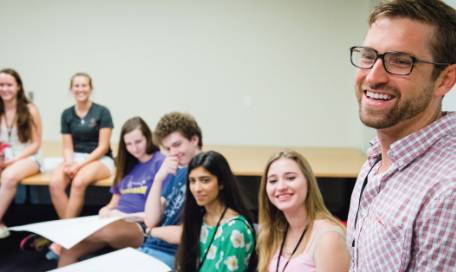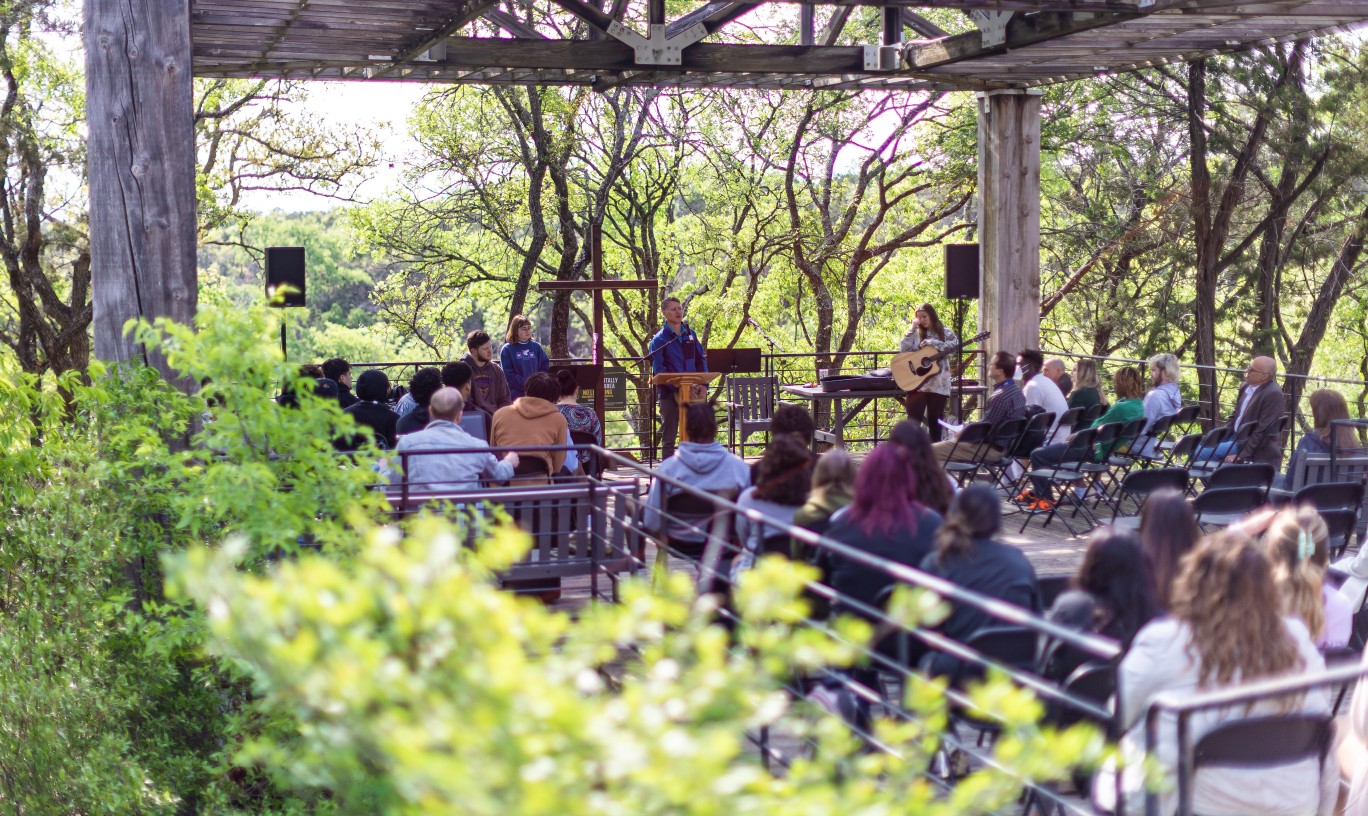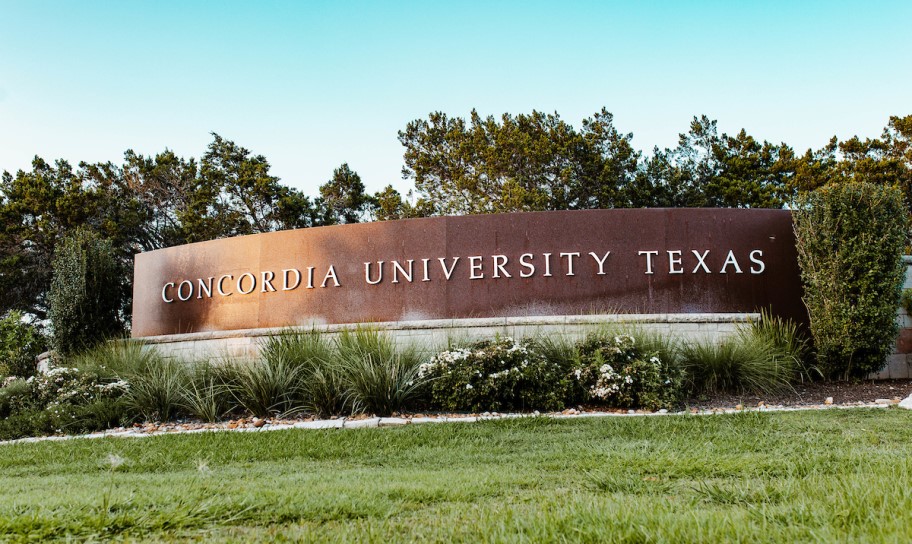Concordia is a place where Christ is honored and all are welcome.
Concordia University Texas is Austin’s leading Christian liberal arts university, where students of all backgrounds experience a high-quality education in a caring community rooted in the Lutheran tradition.
At Concordia, we challenge students to think critically, explore fearlessly, and lead with courageous compassion. Our Christ-centered curriculum empowers students to make a meaningful impact, both in their vocation and by learning to serve their neighbors and communities. In our classrooms, students participate in open dialogue, receive personal attention from professors who are prepared to answer tough questions about the world, and learn the power of asking questions.
*This page was updated April 16, 2025.
Concordia University Texas
Lutheran Identity in Action
In the Classroom
Our approach to teaching and learning at Concordia is shaped by what we call the Lutheran Learning Model. Learn more about how this model guides and influences learning at CTX.
Here I Learn
In Our Vocations
Our Lutheran values enlighten and guide all of our journeys, no matter our roles at the University. Find out how we live out our organizational ethos in the Concordia Lutheran Identity Guide.
CTX Lutheran Identity Guide
In Our Campus Ministry
Ministry is pervasive on campus, from chapel services and student-led worship to life groups and community outreach. Find out how our Campus Ministry team ensures students and employees encounter Christ at Concordia.
Campus MinistryThe Concordia University Texas Board of Regents affirms its alignment with the Lutheran Church Missouri Synod and commitment to the authority of Scripture and Lutheran Confessions. The Board is committed to continued service to the LCMS through church worker education and other partnerships and instituting a set of policies by which it will ensure an ongoing faithfulness to the LCMS and its teachings.
On November 8, 2022, the Concordia University Texas Board of Regents voted to become the sole governing body of the institution by amending its bylaws. This change was communicated to the Concordia University System (CUS) and The Lutheran Church – Missouri Synod (LCMS), and meetings were held on January 12, 2023, to discuss the matter. However, after thoughtful deliberation and prayer, the Board reaffirmed its decision to remain the sole governing body of the University on Tuesday, April 4, 2023. The Board of Regents is committed to upholding the University's Lutheran identity and values and will work closely with the LCMS and other partners to ensure this commitment is reflected in all aspects of the University's operations.
As Concordia University Texas explores a change in the University’s governance, hear directly from Dr. Kristi Kirk, president and CEO, about the purpose and reasons influencing this governance conversation and what this means for the University’s future.
Memo from the President 2/11/2025

Additional Information
The questions and answers below provide additional context about the potential governance change. If you have further questions, please email Dr. Kristi Kirk at Provost@concordia.edu.
-
As of July 2024, what is the status of the lawsuit that the LCMS filed against Concordia
Texas?
Over the first six months of 2024, legal representatives for both the LCMS and CTX filed a series of motions regarding CTX’s pleadings requesting the dismissal of the case filed by the LCMS against CTX in September of 2023. We are currently waiting on a ruling of that request from the United States District Court for the Western District of Texas Austin Division.
-
Does this change represent a move to becoming a secular institution?
Concordia has invested significant resources over the last 15 years to understand and reinvigorate its identity as a Lutheran university and is more intentional about its Lutheran identity than ever before.
The history of higher education in America, specifically church-related higher education, is complex and should not be reduced to a simple phrase or single trajectory. Christian institutions across America have very different relationships with their church bodies, and many are thriving in their vocations as Christian colleges and universities. Hillsdale College, which many (even in our Synod) point to as the gold standard of Christian higher education, has no formal relationship with a church body and is purely self-governing, yet is seen by many as unwavering in its Christian liberal arts missions. Similarly, Luther Classical College, currently being developed in the Wyoming District of the LCMS, will have no formal governance affiliation with the LCMS.
Concordia remains committed to doing the same, continuing what we have done since our founding in 1926 – providing Christ-centered higher education that is faithful to our Lutheran history, theology, and practice
-
What are the Demonstrations of Lutheran Identity?
The CTX Board has developed a set of guiding principles known “Demonstrations of Lutheran Identity,” This set of principles provides accountability towards Lutheran doctrine and practice and will be reported on annually to the Board of Regents, after which that report will be shared with the President of the Texas District and other interested parties and remain available to the public. In addition, the Board will initiate an external review of the University’s Lutheran Identity every three years. These Demonstrations of Lutheran Identity transparently share how Concordia interprets and lives out its identity as a Lutheran institution of higher education.
-
How does this change in governance affect students in church work programs
CTX is no longer able to certify church work students for a call under the LCMS system. However, we continue to run strong, faithful academic programs that prepare students to be effective workers for the Kingdom in Lutheran churches, schools and ministry. We remain committed to a religious education (DCE) program, to education programs focused on Lutheran and Christian school preparation, to preparing students who want to lead music in church settings, and programs which equip those who are considering seminary.
CTX is partnering with LCMS ministries that will work with our graduates, allowing to start their ministry careers while working towards their first call via the LCMS colloquy process.
-
Why was this change necessary?
The governance relationship between the LCMS and its institutions of higher education goes back for decades (for more than 98 years, specifically for Concordia Texas) and has evolved many times over that time as the needs of both the institution and the Synod have changed. This has been seen in various entities like the Board of Higher Education, the Board for University Services, and the current Concordia University System.
The evolution of this relationship to meet the current needs of both the Synod and the institution has been a regular part of the history of the Concordias. At its triennial convention in 2023, the LCMS approved a new set of bylaws that are dramatically different from those under which the schools had been governed in the past. In reviewing the various iterations of those bylaws as they were being developed prior to the 2023 convention, the CTX Board of Regents came to believe that those bylaws were not the right governance model for either CTX or LCMS in the current context. Therefore, the CTX Board voted in November of 2022 to be the sole governing body of the institution. This governance model allows for local control while ensuring that the University continues to align itself with the mission and ministry of the LCMS.
-
What are the benefits to CTX and the LCMS of this governance change?
We believe that the best system of governance is one that is held by those closest to the institution while also being aligned theologically with the Church, as is the case for the governance of LCMS congregations. More specific benefits to this change include:
- Matching authority with responsibility in the proper governing entity. The former system of shared governance created ambiguity, creating risk for both the school and the church.
- Providing the CTX Board with the capacity to articulate the mission and vision appropriate to the university's specific context.
- Empowering the CTX Board to shape itself and its membership in a way that is appropriate to the university's specific context.
- Placing the authority to select the president in the proper entity.
- Relieving the LCMS of responsibility for any possible legal liability, which can potentially occur with numerous potential incidents.
- Relieving the university of the effects of the ambiguities and vacillations in policy by changes at the LCMS conventions.
-
How will Concordia participate in LCMS support agencies like Concordia Plan Services
or LCMS Foundation?
Participation by CTX in any of the LCMS support agencies is determined by LCMS Policy and the boards of each entity. While CTX was recently withdrawn from participation in the Concordia Retirement Plans and Insurance, it continues to have a banking relationship with Lutheran Church Extension Fund, and both the LCMS Foundation and Legacy Deo currently holds several of the school’s endowments.
-
What does “aligned with” mean?
We want and value a relationship with The Lutheran Church-Missouri Synod.
The decision to change the form of governance simply reframes the nature of that relationship so that governance will be solely directed by the CTX Board of Regents rather than shared with the Synod.
This is not about theology or doctrine; nor is our relationship with the Lutheran Church-Missouri Synod broken. Concordia University Texas is not cutting ties or seeking to become an independent or secular institution of higher education.
This is about governance. It will allow the university to have the appropriate local control while planning for our future.
We are deeply thankful for our Lutheran theology, history, and practice, and we will continue to live out the mission of the church by remaining faithful to scripture and the confessions; engaging with the broader culture and being a light to the world; continuing to train workers for the church; sharing the gospel with students; and, partnering with LCMS entities to help them live out their mission.
Concordia University Texas will:
- Remain Christ-centered and committed to sharing the Gospel with students;
- Continue to serve churches, schools and other ministries, including preparing students to enter into church work vocations;
- Continue to be faithful to the centrality and authority of the scriptures;
- Be faithful to the Lutheran Confessions.
- Ensure that key administrative positions and Board members are active members of LCMS churches;
- Create a set of governing documents that ensure the institution will remain aligned with the LCMS long into the future.
-
How will CTX avoid “mission drift” or theological drifting from the doctrine and theology
of the LCMS?
The CTX Board of Regents has developed a series of governing documents that will ensure that Concordia remains aligned with the theology and doctrine of the LCMS. These documents consider and address issues such as:
- Ensuring the membership of the Board and critical administrative and faculty positions are filled by members of the LCMS
- Establishing a system of theological review every three years, done by a team of external reviewers who report back to the Board
- Establishing a system of Demonstrations of Lutheran Identity, which will be measured and reported to the Board annually
- Ensuring that the mission, website, and all handbooks identify CTX as a Lutheran institution, aligned with the confession of the LCMS, and ascribing to Article 2 of the LCMS Constitution
- Forming and continuing partnerships with the ministries of the Texas District and beyond to ensure our partnership in ministry declares the Gospel of Jesus Christ to the world
- Ensuring that the Board and the faculty/staff receive regular training in Lutheran identity and support in living out their callings at a Lutheran/Christian institution
- Ensuring that we continue to address cultural questions - such as our commitment to Diversity, Equity, and Inclusion - in a manner that is reflective of Lutheran theology and practice
-
How does this affect called workers and other employees?
Because of the Board’s decision to be the sole governing body of the institution, Concordia University Texas is no longer an institution that is eligible to hold calls through the LCMS. Effective April 5, 2023, all called workers at Concordia were notified that they would need to move to inactive status (either candidacy or emeritus) or resign from the roster, as per LCMS bylaws. Each called worker is currently working through this under the direction of District President Mike Newman.
All of our current rostered workers remain faithful to their vows as ordained and commissioned ministers of the LCMS, deeply committed to the theology of the church and to expanding the Kingdom by sharing the Gospel. Each of these individuals will continue in their ministry roles, faithfully living into the vocations in which God has called them. They continue to be faithful ministers of the Gospel, teaching in our classrooms, leading our church work and campus ministry programs, and other areas of vocation in a way that serves our LCMS partners and the church at large.
Recently, the Lutheran Church—Missouri Synod released a report that questioned Concordia University Texas’ commitment to its Lutheran identity. People familiar with Concordia know that any claim that the University is Lutheran "in name only" is absurd.
At E3 Alliance, we understand the significance of bolstering education systems across our region. Those early childhood to post-secondary to career pipelines will produce the next generation of leaders and drive economic prosperity. We know that Concordia is part of one of the strongest pipelines accessible to our region. We have worked closely on efforts to deeply analyze practices and make sure they can best serve all students, while staying true to their Christ-centered values.
By offering education that is affordable, accessible and inclusive, Concordia is a beacon of light for all education institutions. Providing an education truly inclusive and supportive to all students will benefit the prosperity of our families and our community.
Susan Dawson, E3 Alliance president and executive director, Austin
Austin American-StatesmanSummer to Fall 2020 - The CTX Board begins reviewing iterations of proposed bylaws, developed by the 7-03 Committee, that direct the governance between the LCMS and its universities, addressing its concerns to the 7-03 Committee over seven months.
February 2021 - The CTX Board passes a resolution by which they voice their inability to support the proposed bylaws and ask the 7-03 Committee and the LCMS Board of Directors to withhold sending them out for review by the LCMS and engage again in dialogue with the University Presidents and Board Chairs.
April 2021 - The CTX Board passes a resolution asking President Christian to prepare a presentation through which the Board might consider if it has any options in the governance structure.
September 2021 - The CTX Board begins reviewing governance options and resolves to continue this discussion in more depth at its December meeting.
December 2021 - The CTX Board passes a resolution to enter into a conversation with the LCMS to explore any options to become the sole-governing body of the institution.
February 2022 - The CTX Board sends a letter to the LCMS Board of Directors, officially asking for a conversation to move its December resolution forward.
February 2022 to April 2022 - The CTX Board and LCMS Board exchange letters regarding the CTX resolution, resulting in the CTX Board resolving to move forward with the LCMS Board of Directors using LCMS Bylaw 3.6.6.4(i) as a starting point.
June 2022 - The CTX Board receives a letter from the LCMS Board that outlines a process by which Bylaw 3.6.6.4(i) will be executed, giving authority to the Concordia University System (CUS) Board to navigate and execute the process.
July 2022 - The CTX Board prepares, approves, and sends a proposal to the CUS outlining what a new relationship might look like.
August 2022 to September 2022 - The CUS asks for further documentation, which the CTX Board resolves to send, asking for a complete response from CUS no later than October 14.
October 2022 - The CTX Board resolves, at a special meeting on October 17, to once again attempt further conversation with the CUS, requesting a process and timeline.
November 2022 - The CTX Board calls for a special meeting to reach a decision about the future governance of CTX, at which time it decides to be the sole-governing body of the institution.
January 2023 - CTX receives the official report from the LCMS. CTX and its Board of Regents meet with representatives from the CUS and LCMS.
April 2023 - Concordia University Texas Board of Regents resolves to maintain sole governance of the institution.
July 2023 - Following a series of letters between the CTX and the LCMS, the CTX Board of Regents asks the LCMS leadership to engage in a process of reconciliation by which to move the discussion forward.
August 2023 - The LCMS in convention passes Resolution 7-03, calling CTX to repentance and to return to the LCMS governance structure.
August 2023 - The CTX Board of Regents agrees to a meeting with the LCMS Board of Directors, asking for full representation from CTX along with a moderator/facilitator to guide the discussion.
September 2023 - The LCMS files its law suit against CTX, President Donald Christian, Board Chair Chris Bannwolf, and says 12 “John Does” will be added at a later date.
November 2023 - LCMS & Concordia Texas agree to enter into a negotiated mediation process. We expect this process to begin later this year.
December 2023 - Representatives from Concordia University Texas and The Lutheran Church–Missouri Synod participated in a mediation in an attempt to settle the lawsuit. Despite the University's genuine efforts to find common ground, an agreement could not be reached during the mediation.
January 2024 - Legal representatives for Concordia Texas filed pleadings requesting the dismissal of the LCMS's lawsuit filed in federal court and initiated a countersuit in Texas state court. The countersuit does not seek any damages from the LCMS or Synod.
February - July 2024 - The LCMS removed Concordia Texas’ state court countersuit to federal court and the federal judge consolidated the countersuit into the existing LCMS federal suit. Legal representatives for Concordia Texas and the LCMS have submitted all pleadings concerning Concordia’s requests to dismiss the LCMS's lawsuit filed in federal court and remand its countersuit to state court. The district judge referred the requests to a magistrate, and the parties are awaiting the magistrate’s decision.



